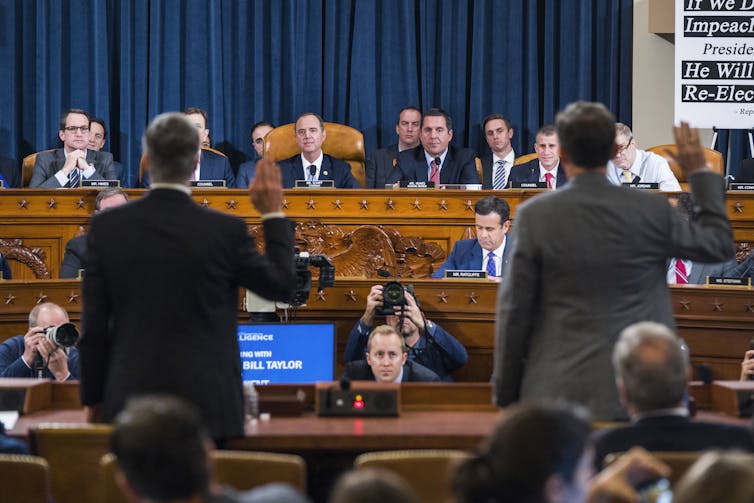House impeachment inquiry may help restore the political and social norms that Trump flouts
- Written by Sunita Sah, Associate Professor of Management and Organizations, Cornell University
President Donald Trump regularly uses blatant violations of long-established social and political norms to signal his “authenticity”[1] to supporters.
Asking foreign countries[2] to investigate and deliver dirt on his political opponents, which prompted an impeachment inquiry in the U.S. House of Representatives, is the most recent example in a long string of norm-shattering behaviors. Other examples of flouting the standards of his presidential office include defending white nationalists[3], attacking prisoners of war[4], abusing the use of emergency powers[5], personally criticizing federal judges[6] and much more[7].
Norms are perceptions or beliefs about what we understand the rules for acceptable behavior to be. They are powerful predictors of behavior. By openly broadcasting his anomalous actions and views, Trump is shifting public attitudes about what is deemed appropriate – not only in politics, but also in society[8].
However, based on my research on institutional corruption, ethical decision-making and the power of professional norms[9], I know norms can be shifted – even reversed – by activities like the House’s impeachment inquiry.
The power of norms
Norms are crucial in understanding how people succumb to unethical influences. We often decide what to do in a situation by first looking at what others are doing.
For example, if a financial adviser[10] starts working in an institution in which her managers and leaders condone unethical practices that put profits over clients, she will understand the norm in that environment to be “self-interest first.” It then becomes perfectly appropriate, and even desirable, for that adviser to succumb to conflicts of interest and neglect or even defraud clients in the pursuit of profits.
Such behavior was evident in financial crises in the U.S.[11] and more recently in Australia, which I examined[12] for the Royal Commission into Misconduct in the Financial Services Industry.
And institutional norms, once set, can be incredibly persistent.
My recent research shows that requiring advisers to disclose conflicts of interest[13] – the ways they would profit from their advice – doesn’t work if the company’s norms put self-interest first. In fact, disclosure in these instances can actually make things worse by leading to more biased advice.
However, if the institutional norm was to put “clients first,” disclosure improved the quality of advice.
 Diplomats testify during the first public impeachment hearing on Nov. 13.
Jim Lo Scalzo/Pool Photo[14]
Diplomats testify during the first public impeachment hearing on Nov. 13.
Jim Lo Scalzo/Pool Photo[14]
How norms shift
Fortunately, Americans draw on many sources of information to perceive norms, not just the president’s deeds and tweets.
The behavior of other people, mass media and laws all factor into how we think about norms – good or bad – and can influence norm shifts.
For example, when the U.S. Supreme Court ruled in favor of same-sex marriage in 2015, a survey of norms and attitudes[15] revealed that Americans perceived stronger and increasing public support for gay marriage after the ruling. This shift in perceived norms occurred in spite of the fact that personal attitudes toward gay marriage did not immediately change.
These shifts matter because norms can actually change our minds over time. A more recent 2019 study[16] found that the Supreme Court ruling on gay marriage ultimately changed attitudes as well as norms, resulting in a reduced anti-gay bias in many parts of the country.
Re-establishing ethical norms
Although people select which news sources and peers to pay attention to, it is hard to ignore the behavior of the president. That’s why pursuing Trump’s impeachment, regardless of whether it is successful or not, is necessary to give a clear, authoritative legal signal of what is unacceptable behavior.
Of course, re-establishing the norms that have been broken over the past few years will take more than the actions of the political party that opposes the president. The voices of Republicans are also important. But so far, their general silence[17] has only strengthened Trump’s ability to break down norms.
Research on obedience[18] and conformity[19] show that all it takes is one dissenting voice to speak out against authority to inspire others to do the same.
If more whistleblowers[20], Republicans[21] and members of the administration speak up, the ethical, social and political norms that Trump has broken may start to regain their vitality.
[ Deep knowledge, daily. Sign up for The Conversation’s newsletter[22]. ]
References
- ^ signal his “authenticity” (www.the-american-interest.com)
- ^ foreign countries (www.wsj.com)
- ^ defending white nationalists (www.theatlantic.com)
- ^ attacking prisoners of war (www.nbcnews.com)
- ^ abusing the use of emergency powers (www.washingtonpost.com)
- ^ personally criticizing federal judges (www.cnn.com)
- ^ much more (www.dallasnews.com)
- ^ in society (hechingerreport.org)
- ^ institutional corruption, ethical decision-making and the power of professional norms (www.sunitasah.com)
- ^ financial adviser (financialservices.royalcommission.gov.au)
- ^ U.S. (www.govinfo.gov)
- ^ I examined (financialservices.royalcommission.gov.au)
- ^ disclose conflicts of interest (doi.org)
- ^ Jim Lo Scalzo/Pool Photo (www.apimages.com)
- ^ a survey of norms and attitudes (pdfs.semanticscholar.org)
- ^ recent 2019 study (www.pnas.org)
- ^ general silence (www.nytimes.com)
- ^ obedience (www.simplypsychology.org)
- ^ conformity (www.simplypsychology.org)
- ^ whistleblowers (www.npr.org)
- ^ Republicans (www.axios.com)
- ^ Sign up for The Conversation’s newsletter (theconversation.com)
Authors: Sunita Sah, Associate Professor of Management and Organizations, Cornell University

